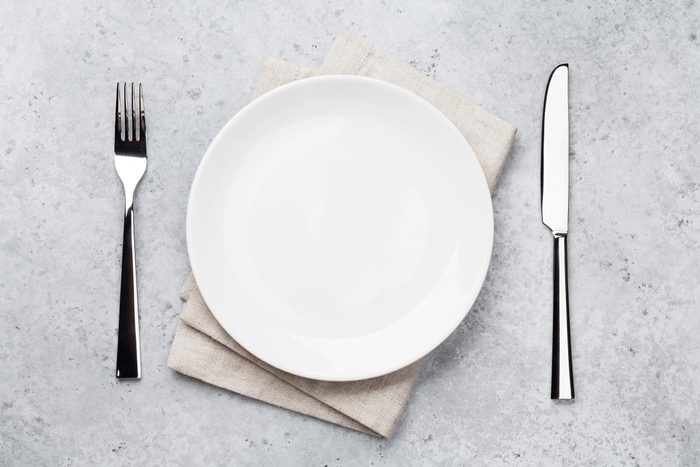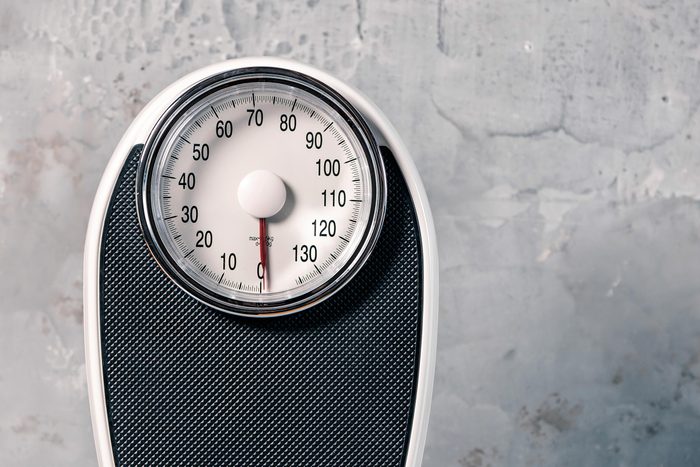Happiness, gratitude. A nice walk. These things are easy enough—yet they can tack years onto your life. Learn the real secrets to healthy living.
17 Things the World’s Healthiest People Have in Common

Your health is in your hands
There’s a lot of doom and gloom in the health world. Every week a new study comes out about something else that can kill you or some new disease to be on the watch for. But did you know that you can prevent the vast majority of the most lethal illnesses simply by tweaking your lifestyle? At least 80 percent of all cases of heart disease, stroke, and type 2 diabetes—and over 40 percent of cancers—are preventable, according to the World Health Organization. And it doesn’t take much to reduce your risk. All you need to do is look at the little habits the world’s healthiest people have in common and see how you can implement them too. Just a few lifestyle changes can add up to major health benefits.

They hang out with their friends
One of the best things you can do for your health is also one of the most fun: Having a close social group of family and friends was one of the top factors correlated with a longer and happier life, according to the doctors and authors of the notable longevity study—and popular book—The Okinawa Program. Loneliness isn’t just painful, it’s deadly, and having someone to hang out with and talk to was even more potent than giving up cigarettes, they found. If you don’t have a strong social group, you can make one: Start with these 17 little things you can do to connect with others.

They don’t smoke
Speaking of cigarettes, if you haven’t quit smoking yet, do it. Like, yesterday. Giving up the bad habit can add eight years to your life and is one of the top five best things you can do for your health, according to research reported by the National Institutes of Health. And it’s not just tobacco smoke you need to avoid: Even though it’s legal in many places now, smoking marijuana is not safer and pot smoke will still damage your lungs, according to the American Lung Association. If you want a long, healthy life, don’t inhale anything other than air. Easier said than done? Try these 23 tips to quit smoking for good.

They go without food every once in a while
Fasting is one of the biggest health trends lately and for good reason. Regularly going without food helped people live longer and get sick less, according to a study published in Nature. But not only did people who fasted regularly live about 40 percent longer than their well-fed peers but their cells appeared biologically younger, making it a literal fountain of youth. You don’t have to live a life of deprivation to get the benefits, however. Recent studies have focused on the concept of “intermittent fasting” or going without food for periods from 12 to 24 hours. This way you get some of the longevity benefits of calorie restriction without starving. Learn more about the benefits of intermittent fasting.

They get some exercise nearly every day
This won’t come as a surprise to anyone who’s read a paper, been on the Internet, or watched TV recently: Exercise is one of the best things you can do for your health. People who did some type of movement most days (they elevated their heart rate for at least 3.5 hours per week) enjoyed significantly better health and had about eight more years on the planet than their couch-potato peers, according to the NIH research. What might surprise you, however, is what counts as exercise. You don’t have to become a gym junkie or run ultramarathons. Simply walking around the block, playing tennis with friends, walking your dog, gardening, taking a scenic hike, or going on leisurely Sunday bike ride all help. Working out not your thing? Try these 26 ways to get fit without formal exercise.

They eat a lot of fish and very few hamburgers
Omega 3 fatty acids, the type found in fish like salmon and sardines, have a long list of proven health benefits, including reducing your risk of heart disease and diabetes, and lengthening your life, according to the Academy of Nutrition and Dietetics. So it makes sense that the healthiest people eat at least one serving of fish per week. Also important was what they weren’t eating—people who limited their intake of red meat were healthier as well, according to the NIH.

They don’t sweat the little stuff
Chronic stress has been linked in research to a higher risk of heart disease, diabetes, cancer, and mental illness but a study done by the University of California, San Francisco finds that it isn’t just increasing your risk for disease but is shortening your lifespan overall. Talk about a double health hit! The trick, however, isn’t to eliminate stress (which seems impossible): The healthiest people learn how to manage the little stresses that come with daily life. If you have a hard time letting things go, try these 37 ways to make managing stress so much less stressful.

They have a higher purpose
When analyzing the world’s healthiest and longest-lived populations for the famous Blue Zones study, researchers found that while the people they studied all had different cultures and religions, they all had a defined sense of purpose. People who have a reason to live, live longer. So whether you subscribe to a formal religion or follow a looser form of spirituality, it’s important to feel connected to something bigger than yourself. This belief promotes healthy behaviors like self-care and compassion for others.

They’re relatively sober
The science on how drinking alcohol relates to health is mixed: One drink a day or less may slightly lower your risk of heart disease but drinking any amount of alcohol seems to raise your risk of cancer. And when it comes to longevity, light drinkers were less likely to die young than people who drank heavily—or not at all. Confused? Basically, each drink over the daily recommended limit (one drink a day for women, two for men) can shorten your life by 30 minutes. “The lack of consistent data means that the takeaway message here is moderation—and the importance of avoiding excessive and binge drinking,” recommend the experts at Harvard Medical School.

They maintain a healthy weight
Being obese increases your risk of nearly every major disease—so much so that maintaining a healthy weight (a body mass index between 18.5 and 24—check yours here) was one of the top five most effective health habits and can add nearly a decade to your life, according to the NIH. If that feels overwhelming, however, even losing just 10 to 15 percent of your weight provides health benefits, even if you’re still in the overweight or obese BMI range, they add. For more tips, check out 50 things doctors wish you knew about losing weight.

They eat a lot of plants
Various healthy cultures emphasize different types of foods but one thing they all have in common? Plants, and lots of them. Regardless of the cuisine, the healthiest peoples loaded up the majority of their plates with fruits, vegetables, legumes, and whole grains, according to the Blue Zones study. The NIH notes that adding more plant foods to your diet will protect you from disease, improve mental health, help you reach a healthy weight, and lengthen your life.

They have quiet time every day
You may not realize just how noisy modern life is until you turn it all off. But it’s important to make space for quiet, daily mediation says Samantha Brody, (known as Dr. Samantha), a licensed naturopathic physician and acupuncturist. “Meditation has been shown in research to reduce blood pressure, increase attention span, help insomnia, reduce anxiety and depression, and increase compassion,” she says. Whether you pray, do a guided meditation, or simply sit quietly and focus on your breath, doing some type of meditation is one of the best—and simplest—healthy habits you can have. Hint: Meditation is one of the ways that cardiologists protect their own hearts.

They spend time outdoors
Aside from the exercise opportunities, spending time outside in nature provides major health benefits. Okinawans, one of the healthiest cultures in the world, have a practice called “forest bathing” that involves being in nature purely for the enjoyment of it. Research agrees: Strolling through forest environments lowers stress hormones, slows your heart rate, reduces blood pressure, improves your immune system, and increases feelings of safety and well-being, according to a study published in Environmental Health and Medicine. There’s a reason they call nature the brain’s miracle medicine.

They go to bed by 10 p.m.
“Sleep is the forgotten aspect of fitness, weight loss, and health, but without getting those eight hours we are overexposing our body to the ‘stress hormone’ cortisol which stimulates cravings and appetites for junk food, breaks down muscle tissue, and stimulates belly fat storage,” says Shawn Talbott, PhD, nutritional biochemist and author of The Vigor Diet, The New Science of Feeling Your Best. But when you sleep may be just as important as how much. Every hour of slumber you get before midnight is worth two hours of sleep afterward, he says. Need more proof? Read up on 11 benefits of going to bed earlier.

They spend less time on Facebook and more time face-to-face
The more time you spend on social media, the less happy you are, according to a study published in Depression and Anxiety. Looking at pictures and reading updates from friends leads you to compare your worst self to their best selves, leaving you feeling sad and left out. Healthy people limit their time on social media and prioritize spending their time with loved ones in real life. Sure, you may miss out on a few baby announcements or birthday pictures but you’ll be happier and healthier.

They look for ways to help others every day
What do we live for, if not to make life easier for someone else? The famous quote isn’t just cute on Instagram, it’s serious wisdom. Healthy people make time to provide service and give to charity on a regular basis and the more they volunteered, the greater health benefits they enjoyed, according to a study published in BMC Public Health. It’s not hard to see why: Helping others helps you do so many other things on this list like finding a supportive social group, getting outside, and finding your higher purpose.

They are parents
People who had at least one child lived an average of two years longer than folks who never became parents, according to a study published in the Journal of Epidemiology and Community Health. That may seem surprising at first, considering how parents have also been shown to have less financial freedom, get less sleep, and get sick more often than non-parents. The reason? While they may be more work when they are little, once they’re grown children provide ongoing support and love for their families, they said.

They count their blessings
Looking for the good in others and the world will certainly make you happier but it can also make you healthier, report researchers at Harvard’s Medical School. The science suggests that optimism helps people cope with disease, recover from surgery, and avoid mental illness. “Research tells us that an optimistic outlook early in life can predict better health and a lower rate of death during follow-up periods of 15 to 40 years,” they added. Now, incorporate these 51 easy health habits into your routine for an even healthier life.
If you’re looking to implement any of these habits into your routine, these habit trackers may help any new habit stick.
